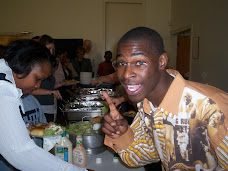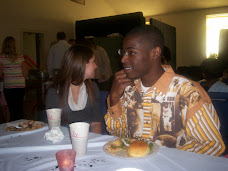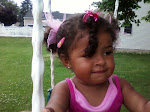When I arrived in the USA, Washington, DC to be exact some hundred years ago I had no idea I would still be here in the great US. My plane landed at Dulles International Airport November 1. It was very cold with snow all over the place, I thought someone had left a very large freezer open and all the ice felt out that day. I was dressed in my Sunday best from Liberia; got to meet my stepfather for the first time. He though I could not speak English so he tried making signs towards me to follow him. I thought he was unable to speak so I followed his directions and got in the car. We got to the house and I did not see any kids playing in the yard like in Liberia or did not see anyone for days on in. I wanted to go back home to my grandparents where all my friends where. For a good week, no one came to the door, the kids did not come to get me to go out and play, I must have cried myself to sleep many nights wishing to go back home. To make matter worst, the food was really bad, the palm butter did not taste the same, the rice nor the fufu smell the same so each day I cried to be send back to Liberia and each day I was told it will get better.
Seven days after my arrival was the first day of school, talk about culture shock; I had no idea the kids did not wear uniform, that the teachers were more afraid of the kids then the kids of the teachers. Lunch for me was not anything of what I was used to seeing on my plate and did not eat until I got home. The first thing my home room teacher Mrs. Lynch told me was “let me know if anyone make fun of you or tease you for the way you speak”. I started to tell her that if I understood what they were saying (Black English) in the first place maybe I would.
The first question one of the students asked me was “how does it feel to be wearing clothes”, to God, I am not lying. They wanted to know if I lived close to Tarzan in the trees and how does it feel to sleep in a house with electric and water. Another wanted to know how I ended up with an English name like Roberta, and was I still afraid of white people, by the way, this was the 70s. They wanted me to speak “Africa” to them, which I still find insulting since Africa is a continent and not a dialect. Even today, I run into adults “blacks” of course still want me to speak Africa to them. I usually give them that “get your stupid self from out of my face and find a library” look and act like I did not hear them. Never seeing Tarzan on TV in Liberia I had to find out who was Tarzan a white person that lived in a tree in Africa and why should I be afraid of him. Then there are the boys who think been from Africa means you know nothing about dating or sex and try to take advantage of you. I felt like everything I knew about my country was a dream and of no reality what so ever; it seems like the white men had washed my country away and replace it with a town unknown to us in Liberia. But the funny part, the whites have never once asked me any of those stupid questions, why, because they know the real true but keep it away from their free slaves hoping they will stay after hearing such stories about where they the slaves came from. It worked. Worked to the point that they think Africa is the worst place to live, even the educated ones is afraid to go to Africa and still make fun at us for various reasons.
I am now hearing from Liberian teens that they are no longer been asked those stupid questions, thank God because these Liberia-war-kids would not have answer nicely. The one thing that seems to interest them now is the names coming out of Africa, so I decided to open this jar of “worm” to educate myself on the subject.
What is in a name: When we are born, we are given name(s) then we are given our last name. In most African counties, your names have meanings, this is not always the case in Liberia, and we tent to give our children English names, bible names and what has been labeled as country names. But really, what is in a name? And why is it so important to us Liberian. One might argue that your name tells us what part of Liberia you are from or your ancestor background; but is it really? Let look at the many ways we get our names in Liberia:
if you are an indigo female married a Congo man, then does that make you a Congo woman?
If you were brought up in a Congo home and carried their last name or last and first sometimes, does this make you a Congo person?
If your last name is a Congo name and you married an indigo man, does this make you an indigo?
How do we know when and where our name start and stop for the beginning of Liberia to now?
Who told us we were Congo because our last name is an English name or we are indigo because our name is an indigo name?
As Liberians some of us are very proud to be called Smith, Thomas, Johnson, Dixon, on the other hand we are also proud to be called Gbeh, Konneh, Sueh, Toun, etc, but really why are those names so important to us, did we not have indigo names before we were bought and sold and then got English names? Is it that we want everyone to know we were slave at one point in our life or we were never slaves by our names? Why have a lot of us not change our name back to where we actually come from? What makes the “white” slave name so important in Liberia or the indigo name after Tolbert Administration? As Liberian, we have indigos that were raised by Congo and carried the Congo names but as soon as the war started when Doe got in, they all ran to the department of public record and changed their names back to their indigo names, some of which they themselves can not pronounce correctly. Why did they choose to change their name? Were the Congo names not good enough? Was the country name a sign of ownership of the country? What made some people to change their names and others to keep the names they already had? Should we have changed our names as soon as we landed in Africa? What impact great or small would it have had if we all had names from the same group? Would we have had the 15 years of war in Liberia? And which groups of name we should have kept the free slaves or the indigo?
Everyone let me know your thoughts
Have a blessed day!
Seven days after my arrival was the first day of school, talk about culture shock; I had no idea the kids did not wear uniform, that the teachers were more afraid of the kids then the kids of the teachers. Lunch for me was not anything of what I was used to seeing on my plate and did not eat until I got home. The first thing my home room teacher Mrs. Lynch told me was “let me know if anyone make fun of you or tease you for the way you speak”. I started to tell her that if I understood what they were saying (Black English) in the first place maybe I would.
The first question one of the students asked me was “how does it feel to be wearing clothes”, to God, I am not lying. They wanted to know if I lived close to Tarzan in the trees and how does it feel to sleep in a house with electric and water. Another wanted to know how I ended up with an English name like Roberta, and was I still afraid of white people, by the way, this was the 70s. They wanted me to speak “Africa” to them, which I still find insulting since Africa is a continent and not a dialect. Even today, I run into adults “blacks” of course still want me to speak Africa to them. I usually give them that “get your stupid self from out of my face and find a library” look and act like I did not hear them. Never seeing Tarzan on TV in Liberia I had to find out who was Tarzan a white person that lived in a tree in Africa and why should I be afraid of him. Then there are the boys who think been from Africa means you know nothing about dating or sex and try to take advantage of you. I felt like everything I knew about my country was a dream and of no reality what so ever; it seems like the white men had washed my country away and replace it with a town unknown to us in Liberia. But the funny part, the whites have never once asked me any of those stupid questions, why, because they know the real true but keep it away from their free slaves hoping they will stay after hearing such stories about where they the slaves came from. It worked. Worked to the point that they think Africa is the worst place to live, even the educated ones is afraid to go to Africa and still make fun at us for various reasons.
I am now hearing from Liberian teens that they are no longer been asked those stupid questions, thank God because these Liberia-war-kids would not have answer nicely. The one thing that seems to interest them now is the names coming out of Africa, so I decided to open this jar of “worm” to educate myself on the subject.
What is in a name: When we are born, we are given name(s) then we are given our last name. In most African counties, your names have meanings, this is not always the case in Liberia, and we tent to give our children English names, bible names and what has been labeled as country names. But really, what is in a name? And why is it so important to us Liberian. One might argue that your name tells us what part of Liberia you are from or your ancestor background; but is it really? Let look at the many ways we get our names in Liberia:
if you are an indigo female married a Congo man, then does that make you a Congo woman?
If you were brought up in a Congo home and carried their last name or last and first sometimes, does this make you a Congo person?
If your last name is a Congo name and you married an indigo man, does this make you an indigo?
How do we know when and where our name start and stop for the beginning of Liberia to now?
Who told us we were Congo because our last name is an English name or we are indigo because our name is an indigo name?
As Liberians some of us are very proud to be called Smith, Thomas, Johnson, Dixon, on the other hand we are also proud to be called Gbeh, Konneh, Sueh, Toun, etc, but really why are those names so important to us, did we not have indigo names before we were bought and sold and then got English names? Is it that we want everyone to know we were slave at one point in our life or we were never slaves by our names? Why have a lot of us not change our name back to where we actually come from? What makes the “white” slave name so important in Liberia or the indigo name after Tolbert Administration? As Liberian, we have indigos that were raised by Congo and carried the Congo names but as soon as the war started when Doe got in, they all ran to the department of public record and changed their names back to their indigo names, some of which they themselves can not pronounce correctly. Why did they choose to change their name? Were the Congo names not good enough? Was the country name a sign of ownership of the country? What made some people to change their names and others to keep the names they already had? Should we have changed our names as soon as we landed in Africa? What impact great or small would it have had if we all had names from the same group? Would we have had the 15 years of war in Liberia? And which groups of name we should have kept the free slaves or the indigo?
Everyone let me know your thoughts
Have a blessed day!









No comments:
Post a Comment